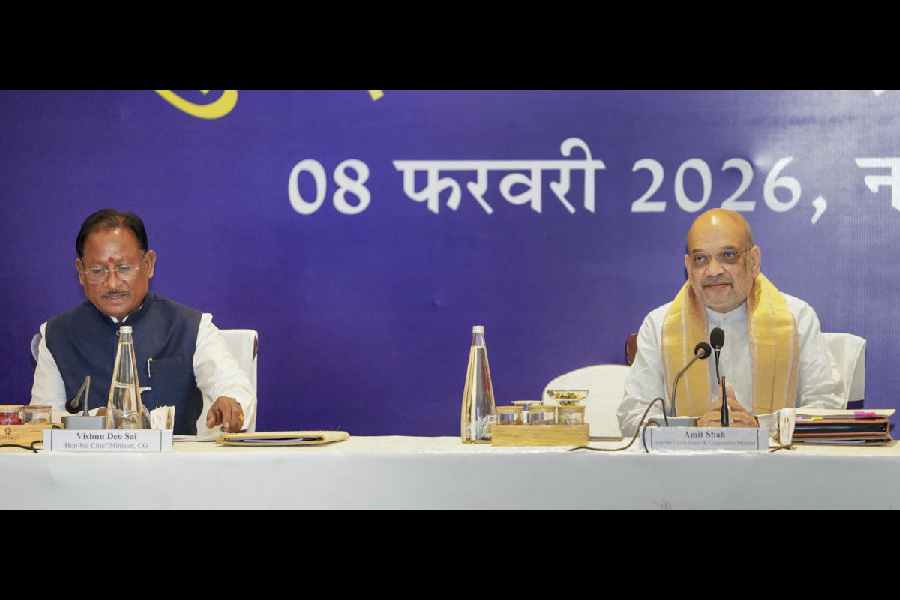Ahmedabad, April 22 :
Ahmedabad, April 22:
When Atal Bihari Vajpayee visited Ahmedabad to remind chief minister Narendra Modi about his 'rajdharma', the Prime Minister set a task: conditions should be created for refugees living in camps to be able to return home.
No one is returning home, preferring the safety in numbers at the camps sheltering some 100,000 people. Some are thinking of leaving Gujarat altogether. A section of minority community leaders is 'seriously considering' migration out of Modi's state to neighbouring Rajasthan and Madhya Pradesh where, they believe, they will not be hounded.
A social worker, who has been attending these 'secret meetings', said: 'Minority leaders are serious about the issue.' A decision, one way or the other, will be taken shortly.
According to the Opposition Congress, migration has already started. 'All those who can flee are leaving relief camps for other states,' AICC general secretary Kamal Nath, who returned to Delhi yesterday from Gujarat, said.
BJP sources said they expected Kutch to become a destination for victims of communal violence in different parts of the state. Again, for reasons of safety in numbers: minorities form 60 per cent of the population in Kutch.
In Delhi, home ministry officials denied reports of the minority community leaving Gujarat. 'There is no such move,' a senior official said.
An intelligence official said: 'Our information is that Muslims are moving out of Hindu areas. The few Hindus who are near Muslim neighbourhoods are also moving out.' But, so far, field officers from the state have not reported migration, he added.
Minority community leaders have taken heart from a reported Andhra Pradesh government proposal to allot 300 acres in the state for Gujarat riot victims. But it appears that it was simply a suggestion made to chief minister N. Chandrababu Naidu who has neither accepted nor rejected it.
Even if such a proposal was there, Gujarat government spokesman I.K. Jadeja does not believe it would be 'workable'. 'Do you think it is possible?' he asked, questioning the premise that people will go all the way from Gujarat to a southern state to begin life anew.
Jadeja was equally dismissive of the possibility of migration to neighbouring states. 'It is all humbug. Baseless rumours.'
But minority community leaders do not think that, given a chance, Muslims would reject out of hand shifting to Andhra.
A large number of non-Gujarati migrant Muslims, who lost their means of livelihood in the riots, have already left the state and returned to their homes. Those who have been left behind are only waiting to collect the compensation before they, too, head out, said Harnesh Pandya, a representative of an NGO engaged in relief work.
Over 1,200 families from the north of the state have migrated to Abu Road in Rajasthan, 25 km from the Gujarat border. Pandya said the minority community felt it convenient and safe to settle in Abu Road, which already has a large Muslim population.
Ataullakhan, a businessman, said if community leaders decide that all Muslims should leave Gujarat, he would pack up, too. Ataullakhan has an established business which, he admitted, would be difficult to set up elsewhere. Still, 'no one was born with business. Life is more important than anything else'.
Explaining why there could be an exodus, Mohsin Qadri, a leading advocate and community leader, said: 'Even if these riot victims are rehabilitated, they will never feel safe in Gujarat. They will be looted again and again. Just as it happened in 1969, 1986, 1992 and now 2002.'
The VHP, Bajrang Dal and other such organisations are asking Hindus to boycott Muslims.
'If Muslims are not going to get jobs in Gujarat and no Hindu is going to do business with us, we will have to migrate. Is there any other option?' asked Qadri.
 Monday, 09 February 2026
Monday, 09 February 2026









